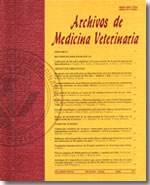Enzymatic and anatomopathological study of laying hens feeding on Lupinus albus seeds (sweet and bitter) for 22 weeks
Main Article Content
Abstract
The effect produced by the incorporation of Lupinus albus var. Multolupa seeds in the rations of laying hens was studied.
One hundred and sixty (34 week old) White Leghorn hens (Shaver Starcross 288) were divided into 4 groups. These hens were fed with a basal diet plus 10% lupine seeds, with different percentages of alkaloids, for 22 weeks. The hens were kept in individual coops. They were fed daily with 112.5 g/fowl and water was given ad-libitum.
The enzymatic study was carried out by measuring the activity of aspartate-aminotransferase, alanine-aminotransferase and alkaline phosphatase enzimes. Liver, brain and kidney samples were collected in order to perform macro and microscopic analysis. A mortality record was kept.
There were no enzymatic values indicating disorder in the hepatic functions due to the lupine seeds. The main morphological alterations were degenerative and necrotic changes in the brain. Degenerative changes were observed in the tubular portions of the kidney. In similar proportions, within the groups, degenerative changes were observed in the liver.
In conclusion, the bitter lupine seeds (2.63% of total alkaloids), incorporated as 10% of the ration of laying hens, during the first phase of laying, do not produce alterations in the tissues examined.

